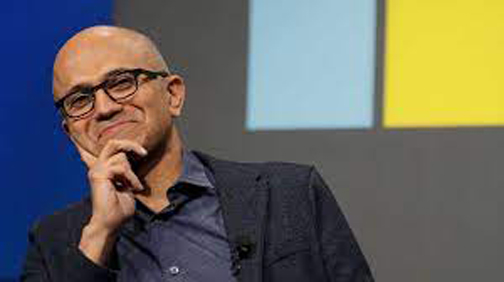
AUSTIN, TX (TIP): Four of Microsoft’s top leaders have received the 2021 C.K. Prahalad Award for their collaborative leadership to transform it into a carbon negative company by 2030 and remove all its historical emissions by 2050.
Besides the software giant’s Indian American CEO Satya Nadella, its President and Vice Chair Brad Smith, Chief Financial Officer Amy Hood, and Chief Environmental Officer Lucas Joppa have shared the award for Global Business Sustainability Leadership.
The award for leadership by an individual executive went to Ecolab Chairman and former CEO, Douglas M. Baker, Jr. for his efforts to educate the business community about corporate responsibility and the business risks of global water scarcity and the need to account for the true value of water in financial decision making.
The awards in the two categories were announced October 12 at the 2021 CEF Annual Leadership Retreat in Austin, Texas, attended by senior executives representing CEF members from Fortune and Global 500 companies with combined revenues of $4 trillion driving sustainability strategy and innovation worldwide. The Award created in 2010 to honor founding CEF Advisory Board member C.K. Prahalad recognizes winners for exemplifying the fundamental connection between sustainability, innovation and long-term business success in a globalizing world.
CEF Founder MR Rangaswami explained what set the Microsoft team’s approach apart.
“Nadella, Hood, Smith and Joppa have exhibited a remarkable level of joint ownership of this moonshot initiative,” he said. “This is the first time we’ve seen a CEO/President/CFO/Environmental Sustainability coalition like this.”
“They’ve defined a new model for what corporate-wide climate leadership looks like while sending a clear message that sustainability is core to Microsoft’s business strategy for the decades ahead.”
With this team at the helm, Microsoft is moving aggressively to advance its vision to make a positive impact globally on the climate, while proving that such steps can also be good for business, the citation noted.
By 2025, the company will shift to 100% renewable energy for its data centers, buildings, and campuses, and it will protect more land than its operations use. By 2030, it will match 100% of its electricity consumption, 100% of the time, with zero-carbon energy purchases – and will push beyond that to actually become carbon negative: to remove more carbon from the environment than the company emits.
“Their approach is holistic, connecting the dots to other aspects of planetary health – including a commitment to replenish more water than the company uses – a goal known as ‘water positive’ – and a pledge to achieve zero waste for its direct operations, products and packaging,” CEF noted. The team has led Microsoft to look beyond the company’s own walls to create the enabling environment for change at scale.
The company has set up a $1 billion Climate Innovation Fund to help accelerate the global development of carbon reduction, capture, and removal technologies.
It is also building a Planetary Computer platform to help monitor, model, and manage Earth’s natural systems.
Beyond that, Microsoft has co-founded a new Green Software Foundation to help reduce emissions within the software industry by 45% by 2030, working with co-founders Accenture, GitHub, and ThoughtWorks to develop new standards, tools, and leading practices.
Celebrating Baker’s leadership during his tenure as CEO from 2004 to 2021, CEF noted he believed business had an imperative to act to ensure the world’s future prosperity through sustainable innovation and collaboration.
Under his leadership, Ecolab became one of the largest water management companies in the world and more than tripled its net sales, while focused on sustainability, water management and carbon reduction.
Under Baker’s leadership, Ecolab joined the Business Ambition for 1.5⁰C, pledging to reduce its emissions by 50% by 2030 and to net-zero by 2050, and led the way in the formation of the Water Resilience Coalition, an initiative of the UN Global Compact CEO Water Mandate.
Baker proved that foresight about water and climate risks was critical to business success. The company helped its customers in more than 170 countries conserve 206 billion gallons of water in 2020, equivalent to the annual drinking water needs of 712 million people.
And Ecolab is on track to achieve its goal of saving 300 billion gallons of water—enough for one billion people—by 2030, CEF said.
In 2020, Ecolab also helped customers avoid 3.5 million metric tons of GHG emissions, provide safe food for 1.3 billion people and prevent 1.8 million infections.
Baker has received several awards for his leadership: In 2019, he was named one of the 100 best-performing CEOs by Harvard Business Review for the fifth year in a row.
In 2018, he received the Deming Cup for Operational Excellence and accepted The World Environment Center’s Gold Medal for International Corporate Achievement in Sustainable Development on behalf of Ecolab. In 2014, Baker was named Responsible CEO of the Year by Corporate Responsibility Magazine.
CEF’s Chair and Co-Founder P.J. Simmons expressed his appreciation for Baker: “Doug has always been a visionary leader, putting sustainability at the heart of his company’s growth strategy. He truly exemplifies the principles C.K. Prahalad espoused and offers an inspiring example of how to lead a company during these tumultuous times.”
“Water is one of the world’s most precious resources and vital to the health of society and industry,” said Baker. “I am honored to receive this award from CEF, and I accept it on behalf of the entire Ecolab team and their vision and motivation to promote responsible water use.”





Be the first to comment